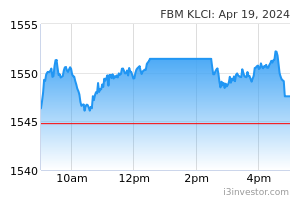The week ahead: 1Q GDP, run-up to Parliament ‘showdown’ in focus

Malaysians may well be on the edge of their seats again watching developments in the run-up to the first Parliament sitting post the so-called “Sheraton move” that led to the installation of the Perikatan Nasional government in early March. The one-day sitting may not be the “showdown” some tout it to be, if the motion of no confidence against Prime Minister Tan Sri Muhyiddin Yassin, filed by Tun Dr Mahathir Mohamad, is not tabled on May 18.
It remains to be seen whether Parliament will sit for more than one day this month, given that Batu Sapi member of parliament Liew Vui Keong’s motion that the May 18 sitting should have eight sitting days instead of one day had reportedly been accepted for debate by Dewan Rakyat Speaker Tan Sri Mohamad Ariff Md Yusof. Currently, Parliament is slated to reconvene only on June 29 after the single morning session on May 18, with the tabling of the 12th Malaysia Plan slated for Sept 7 and Budget 2021 on Nov 30, according to its website.
This Wednesday, it is Malaysia’s turn to release its first quarter gross domestic product (GDP) figures for 2020 and expectations are for it to be the first negative reading since the third quarter of 2009. This is no surprise, given the sea of red seen across the globe at countries that released their figures earlier, including Malaysia’s largest trade partners.
An advance GDP report shows the US economy shrinking 4.8% in the first quarter, its worst reading since the 2008 global financial crisis. In mid-April, China said its economy shrank 6.8% in 1Q2020, its first contraction since 1976 as the country implemented large-scale shutdowns to contain the spread of the coronavirus.
Similarly, Singapore’s 1Q GDP contracted 2.2% , South Korea’s declined 1.4%, and initial readings were an 8.9% drop for Hong Kong and a 3.3% fall for the eurozone. Japan — which already reported a 7.1% contraction for the October to December 2019 period after an increase in sales tax from Oct 1 hit retail spending — is expected to report negative growth not just for the coming quarters, but also possibly for the full year.
The UK — which is expected to announce its roadmap for lifting its lockdown on May 10, is slated to release its 1Q GDP numbers on May 13.
Malaysia’s economy reportedly loses RM2.4 billion per day from the Movement Control Order (MCO). Chief statistician Datuk Seri Mohd Uzir Mahidin said the higher unemployment rate reflects the negative impact of the lockdown on the labour market when he announced last Friday that unemployment rose to 3.9% in March (3.3% in Febuary 2020 and 3.4% in March 2019) — the highest since it hit 3.6% in June 2010 but lower than the all-time high of 7.4% in 1986. The number of jobless persons rose to 610,500 in March (525,200 in February 2020 and 521,300 in March 2019).
The impact of lockdowns is even more pronounced in the US, where more than 33 million people have claimed unemployment benefits over seven weeks (March 15 to May 2). Even though last week’s 3.169 million was the lowest weekly figure in the past seven weeks, the upcoming weekly release by the US Department of Labor on Thursday will continue to be watched, as will the University of Michigan consumer confidence survey on May 15.
Other notable regional data releases this week include China’s and India’s industrial production and inflation figures for April. Malaysia will also be releasing its monthly manufacturing statistics and industrial production index for March on Tuesday.
It remains to be seen whether Malaysia will update its 2020 GDP growth forecast after the release of 1Q numbers. Bank Negara Malaysia did not revise its 0.5% to -2% GDP projections for the whole of 2020, even after the MCO was extended beyond the initial four weeks. The central bank — which last Tuesday cut its benchmark rate by 50 basis points to 2% — sees unemployment averaging 4% for the full year, expecting rehiring to take place towards the latter part of the year.
First quarter GDP figures would have included data from the first two weeks of the MCO, which began on March 18. Most businesses were only allowed to reopen when the Conditional Movement Control Order (CMCO) phase kicked in from May 4, more than one week earlier than the end of the fourth phase of the MCO on May 12.
Social distancing rules or standard operating procedures (SOP) are expected to continue to apply in the weeks and months ahead until a vaccine is found. While new clusters were found last week, the number of new cases remained at double digits every day in the first five days of the CMCO (May 4 to 8). The impact of Covid-19 test requirements on employers and industries with sizeable foreign labour is likely to be watched.
Over at the Kuala Lumpur High Court, former prime minister Datuk Seri Najib Razak is slated to appear before Justice Collin Lawrence Sequerah on Wednesday as the trial involving RM2.28 billion 1Malaysia Development Bhd (1MDB) funds resume. The 1MDB-Tanore trial, which was last heard in court on March 12, is expected to resume with the cross-examination of the ninth prosecution witness, Datuk Shahrol Azral Ibrahim Halmi, who was 1MDB CEO between 2009 and 2013 and a board member until 2016.
On the Malaysian corporate front, Bursa Malaysia is closed on Monday for the Nuzul Al-Quran holiday. Companies reporting their latest quarterly earnings for the period ended March 31, 2020, this week include Dialog Group Bhd, Gas Malaysia Bhd and S P Setia Bhd.
Companies that will hold their annual general meetings this week include United Plantations Bhd on May 12 while those holding virtual extraordinary general meetings (EGM) include Johan Holdings Bhd and VSolar Group Bhd, both on May 13.
( 24,36 % )
( 39,38 % )
( 36,26 % )


